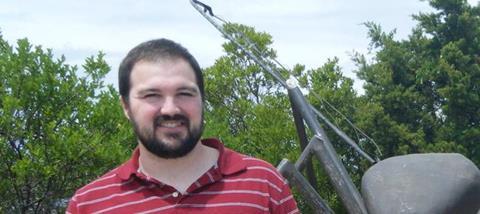
Dr. Wayne Rossiter is the assistant professor of Biology at Waynesburg University and earned his PhD in ecology and evolution from Rutgers University.
Growing up, Rossiter describes himself as a "sciencey kid" who was obsessed by chemistry, meteorology and especially, biology. Rossiter was fascinated with the idea of origins, and this parlayed into an interest in history and philosophy as he continued to mature.
As Rossiter entered college he became a confirmed atheist in his views, and then progressing toward graduate school, became ever more combative in his atheism. He described himself as a "staunch and cantankerous atheist" who sought every opportunity to destroy Christianity where it stood. He was, he says, "of Dawkins' ilk."
Rossiter notes in his book, Shadow of Oz, that the academic environment tends to insulate one's views, so that outside views and criticisms are largely dismissed or ridiculed without being critically considered or even clearly understood.
Rossiter’s conversion from atheism to theism was sudden and violent. He describes a winter's night in March of 2008 after he and his wife had finished celebrating an academic milestone. She went to bed, but he stayed up to ponder the dying celebration, and ask these questions:
"On what rational grounds could I care about the state of the planet (or even my family) after I’m gone? And what did I even mean by 'good' or 'bad'? I couldn't argue that any objective morality existed apart from our subjective experiences. Any moral laws that might objectively exist – whether or not anyone ascribes to them – would be beyond our grasp, and we would have no objective or rational reason to obey them if they did exist.
"Nothing mattered. This is Dennett’s 'universal acid' and Darwin’s ideas applied that acid to the human condition. If molecules led to cells, and cells to organs, and organs to bodies, then the 'molecules-to-man' hypothesis was true. We really were just wet computers responding to external stimuli in mechanical and unconscious ways. No soul, no consciousness. Just machines. I was completely and utterly devastated."
When he had this soul-crushing crisis of realisation that atheism was philosophically bankrupt, and could not supply the foundation for the standards which he assumed, he realised the consequences of his reasoning were grim and that his current worldview wasn't defensible.
Rossiter began to flail, existentially. He explored philosophy and psychology – which including getting counseling. Rossiter's counselor happened to be a Christian. Previous to this crisis, the biologist would have dismissed or even attacked the therapist's beliefs. Under these circumstances, however, it intrigued him that a professional and a person he could respect could hold to such beliefs.
Having found his own beliefs to be lacking, he began to read Christian intellectuals to see if they had really found some way to reconcile their scientific ideas with their religious faith, or if they had all just been poorly held together patchworks of cognitive dissonance. Surprisingly, the Christian worldview actually seemed to make sense of science for Rossiter.
He became a Christian, and began teaching at a Christian College in Pennsylvania.
After listening to and reading other scientists and science populisers who were also Christians, he notice many of them were simply becoming yes men to the scientific models which he had found increasingly inadequate over the years since he had left Rutgers.
In response to this, Rossiter wrote his book Shadow of Oz: Theistic Evolution and the Absent God. This book tells some of his personal story, but also attempts to address some of what he sees as increasingly bad science in the Christian camp.
Click here to request a free copy of Premier Christianity magazine



























